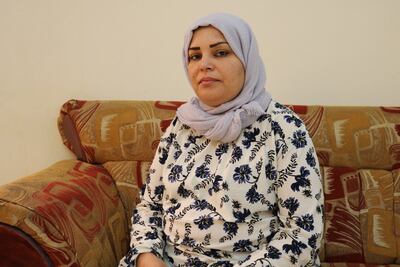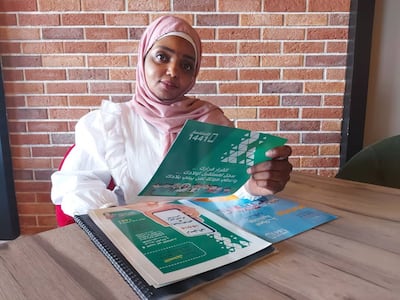Ghalia Al Mansouri, 67, has never cast a vote in a Libyan election in her life, and had no intention of starting until one morning in early August.
“My neighbour’s daughter visited with pamphlets on voting rights and the coming elections," said Ms Al Mansouri, who lives in the town of Suluq on Benghazi’s outskirts.
"She said she’s an electoral outreach ambassador. I knew her and trusted her, so I listened."
Libya's High National Elections Commission is preparing for the war-ravaged country’s first presidential election on December 24, followed a month later by its second legislative race since the 2011 uprising.
To increase women’s participation in the polls and undo the damage to their trust in the political process caused by a decade of civil war, the commission organised the Electoral Outreach Ambassadors programme.
The initiative, conducted in partnership with the International Foundation for Electoral Systems, aims to raise women’s awareness of their political rights, focusing on those in remote areas, or who have limited or no formal education.
“The ambassador said it was a right and duty to vote," Ms Al Mansouri told The National. "She said my vote won’t just bring change for me, but for my children and grandchildren.
"Her words resonated so I asked her to show me how to enrol."
Doubling registration
She is one of the 1.24 million Libyan women the commission said were added to the electoral roll in the registration period that ended on September 18 – twice the 603,708 women who enrolled before the 2014 polls.
Those registered for 2014 had to re-register for the December vote.
Suzan Hemmi, head of the commission's gender unit, credited the increase to fewer than 100 female volunteer ambassadors from 23 districts across Libya.

“The ambassadors are well-spoken, have experience in civil society participation and are not affiliated with any political or religious groups," Ms Hemmi said.
She said the neutrality of the envoys, who were chosen from 600 applicants, was crucial.
The country is still reeling from years of civil war in which two factions in the east and west also used tribal and religious faultlines to establish alliances.
Abeir Imneina, head of the Washm Centre for Women's Studies and a member at the faculty of economics at the University of Benghazi, said the violence overshadowed women’s issues and sidelined them as political participants.
“The transitional period was marred with different forms of violence against women, whether from families or tribes who feared for their safety and so prevented them from practising their political rights, or by militants,” Ms Imneina said.
She said female activists were harassed and even murdered by extremists.
Women hold only 16 per cent of Parliament seats and five posts in a 32-portfolio Cabinet, despite interim prime minister Abdul Hamid Dbeibah’s pledges to give 30 per cent of Cabinet positions to women.
In the three post-2011 elections, womens’ participation declined from 14 per cent to 10 per cent, then 8 per cent.
The conflict also affected the programme. Set to be launched in 2019, it was suspended months later because of an increase in fighting and the outbreak of Covid-19.
A tailored approach

The programme resumed in March after the appointment of Mr Dbeibah’s UN-backed unity government, and promises of elections in December and a fresh start for Libya.
By then only 75 ambassadors remained. Others dropped out because of continued security concerns, Ms Hemmi said.
Ambassadors were trained in how to develop awareness campaigns, among other things, then left to lay out the strategy best suited for the district to which they belong, based on its size, its number of women and their ages.
In Al Kufrah, a tribal district nearly 2,000 kilometres from the capital Tripoli, Rima Tuka Armi said she used a combination of house visits, workshops in private and public institutions, and talks with women in public spaces.
Eman Ayad, 35, a nurse, came across her district’s ambassador in the Benghazi hospital in which she works.
“Initially we ignored her," Ms Ayad said. "We are sickened by politicians and their indifference towards our delayed salaries or our abuse by militants.
“But at lunch time, she joined us in the cafeteria and told us of the brothers and relatives she lost in the war, and her belief that change is possible if we all did our part.
"It moved us and it made sense that boycotting the vote won’t bring change. We registered.”
Converting registrations to turnout
Praising the programme’s aims and achievements, Ms Imneina noted that its reach remained limited with the space to cover and the time left before the election.
“Not all regions of Libya were assigned ambassadors due to their limited numbers,” she said.
Despite the team's efforts, only half of Libya's eligible women voters are registered, according to electoral commission figures.
Ms Hemmi said that increased enrolment of female voters does not necessarily translate into participation on voting day, and that tribal and societal pressures in some regions could still influence women’s electoral decisions.
But she asserted that ambassadors would be returning to the streets in coming months to encourage women to collect their electoral cards and practise their constitutional duties on poll days.
This article was written in collaboration with Egab.








